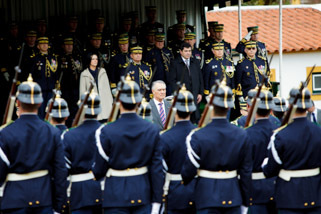
Coming to Casa de Mateus is always a great pleasure for any visitor.
Immediately we enter the forecourt and see the magnificent frontispiece, the weight of history is reflected in the baroque façade of the building.
Here, nature and art become singularly harmonized, within this so rarely found convergence of architectural design and landscape, which the owners have been able to preserve throughout successive generations.
Here, past and tradition are associated with modernism, as is visible from the initiatives that Casa de Mateus has promoted in the last few decades, of which the D. Dinis Prize is such a splendid example.
Culture has lived here for nearly three centuries, together with the day-to-day work on agricultural activities, and art becomes integrated in the symmetry of the gardens and the austere landscape of Trás-os-Montes.
Few names would anyway be more adequate and filled with symbolism for the literary prize that brought us here today than that of D. Dinis, a king to whom the people gave the epithet of Farmer and simultaneously Troubadour, the king that planted pine forests and wrote poetry, that promoted development and founded the first university, defined the borders of the territory and instituted Portuguese as the court’s official language.
But the D. Dinis Prize, beyond its name that for us is so paramount, also possesses itself a history, a history that is compounded with that of Portuguese literature in the last three decades.
It is true to say that, throughout its 31 years existence, this prize has distinguished a significant number of the most relevant works that have meanwhile been published in Portugal.
In fiction, as well as in poetry and essays: from Agustina Bessa Luís to Hélia Correia; from Sophia de Mello Breyner to António Franco Alexandre; from Vergilio Ferreira to Vítor Aguiar e Silva, we may safely assert that practically all the greater figures in contemporary Portuguese literature have been distinguished with the
D.Dinis Prize.
It is this already long array of prestigious names that João Barrento is now joining, an essayist that has been awarded this prize by the jury for his book “O Género Intranquilo” (The Restive Genus) and to whom I am very pleased to sincerely congratulate.
João Barrento’s work is well known, above all in the academic environment, not just due to his essays, but also for the many translations he has carried out, some of them meanwhile awarded with diverse prizes.
Thanks to this work, carried out with persistence and rigour recognized by all, some of the most important German authors have been translated into our language, thus placing at the disposal of Portuguese readers a full cultural universe that would otherwise remain unknown by a large majority.
Simultaneously, however, with his work as a translator, João Barrento is also the author of many essays, which reveal a very deep knowledge of contemporary culture.
The book to which the jury attributed this prize contains precisely a number of texts in which João Barrento expresses his thoughts on the specificity of literary essays, recurring to some of the authors who better perceived this. Amongst them we can find Eduardo Lourenço and also that other great essayist Eduardo Prado Coelho, who passed away a few years ago, and who many of us knew of and admired, due to the intelligent and original way in which he took part in public life and influenced our cultural environment.
I thus want to highly congratulate the prize winner, hoping that he may continue the successfully develop his work and the contribution he has given to the internationalization of our universality and of Portuguese culture.
Also to be congratulated are Eng. Fernando de Albuquerque and the Casa de Mateus Foundation, for the endeavour they have placed in bringing to a location so distant from the large centres, but immortalized by Camilo Castelo Branco and Miguel Torga, a literary prize with such a wide national projection.
We all know how the interior of the Country has been the victim of abandonment and condemned to a progressive desertification, in the face of which we cannot lower our arms, nor let it go by, as if it were inevitable.
There are happily, in many sectors of activity, opposite examples showing that it is at least possible to diminish the loss, for the peoples and for national cohesion, derived from the negligence to which they have been subjected.
Casa de Mateus is, above all in the cultural field, one of these examples. The multiple activities that throughout years have been carried out here are the best proof that fidelity to family values and to local history is not incompatible with cosmopolitan dynamics, neither with the promotion of the most sophisticated artistic events.
We hope that many other such examples may appear as well as other centres of regional assertion and development, not just in the cultural field, but equally in the remaining sectors of activity.
This demanded by regional planning, by the well being of the people and by national interest.
© 2006-2016 Presidency of the Portuguese Republic
You have gained access to the records of the Official Site of the Presidency of the Republic from 9 March 2006 to 9 March 2016.
The contents available here were entered in the site during the 10 year period covering the two mandates of President of the Republic Aníbal Cavaco Silva.